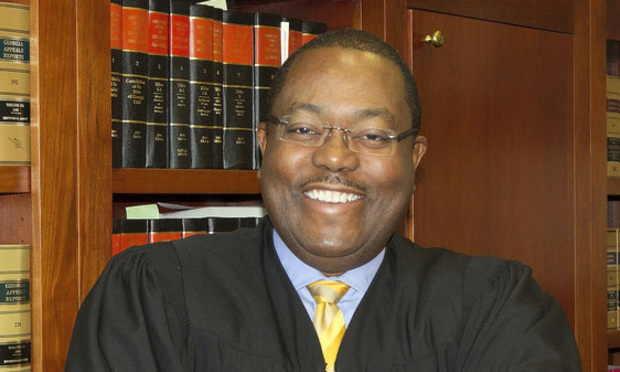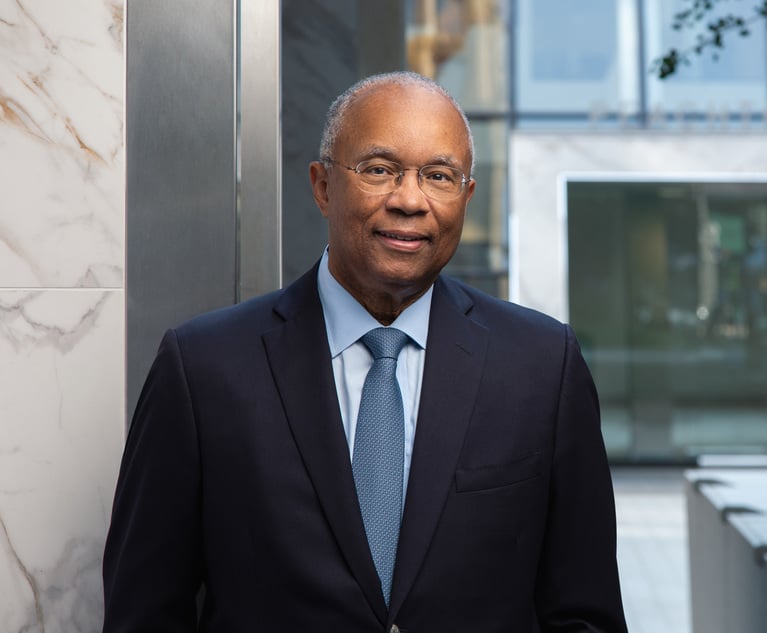Distinguished Leader: Judge Horace Johnson Jr.
Without the Parental Accountability Court, "these participants would have likely languished in and out of the county jail and certainly not have made real steps in becoming and staying consistent supporting parents."
June 19, 2019 at 02:00 PM
5 minute read
 Judge Horace Johnson, Alcovy Judicial Circuit (Photo: William Brawley)
Judge Horace Johnson, Alcovy Judicial Circuit (Photo: William Brawley)
Judge Horace Johnson Jr. told Atlanta magazine in 2015, “The law is about inclusion. And inclusion is more than just words.”
Indeed, Johnson was one of a handful of children who integrated Newton County schools in the 1960s. He went on to graduate from Emory University and the University of Georgia Law School.
As he told the magazine, after three years in private practice in Atlanta, he noticed there were no black lawyers in Newton County, so he started a firm there. He practiced in Covington at Johnson & Freeman and served as a judge pro tem in the Newton County Juvenile Court.
When the Legislature created a fourth judgeship in the Alcovy Circuit, Gov. Roy Barnes tapped Johnson for the post, and voters have returned him to office in subsequent elections. He told the magazine that his role on the bench can be a powerful symbol for defendants: “If there's a person who looks like them, folks might feel like the system is open to them.”
He presides over a Parental Accountability Court, served as president of the Council of Superior Court Judges of Georgia, founded Newton Mentoring and serves on the Judicial Council of Georgia.
What is one of the most compelling memories of integrating Newton County Schools?
I was among five African American students who enrolled at Ficquett Elementary School at the beginning of the 1965-66 school year. I was a fourth-grader. While my parents, both educators, had numerous conversations with me about what I might expect in this new environment, the students were for the most part all very welcoming. My teachers, too, were all very polite.
I made some wonderful friendships at Ficquett, some that have lasted now for more than 50 years. These friendships are among the most lasting memories of the experience. In the fall of 1969, our community's main African American school, R.L. Cousins, was re-opened as a new fully-integrated junior high. Unfortunately, too many of the students at Ficquett, whom I counted as good friends, didn't make the transition to eighth grade at R.L. Cousins Junior High but instead attended new private schools, many of which opened their doors for the first time also that very fall.
While the experience overall was favorable based on my friends and teachers, I learned years later about the necessity and importance of parental involvement in your children's education. I recall that my parents were engaged in my education, but not overbearing so as to make my social experience awkward. They, however, actively monitored my progress to ensure that I was being academically challenged, and, if they thought anything was amiss, they did not hesitate to voice their opinions to teachers and administrators. They later shared that, during those early years, unspecified and unsubstantiated issues were raised that could have hindered my academic progress. Of course, my mother, who was a “tiger” mom before the phrase existed, was not having any of that.
What is one of your biggest challenges in presiding over a Parental Accountability Court?
Our Parental Accountability Court, is one of the four specialty court programs in the Alcovy Circuit. I was privileged to begin PAC first in Newton County in 2012, expanding to Walton County two years later. I also initiated a Veterans Treatment Court in the circuit in 2016.
Presiding over those specialty courts, in addition to my regular dockets, has been both rewarding and challenging. Working with a team that includes prosecutors, strong and consistent coordinators, volunteer counsel, treatment providers, prospective employers, along with various other community stakeholders, and, of course, the participants, has brought about some transformative experiences. The financial impact of the PAC program, coupled with rebuilt self-esteem, is enabling participants to stand tall and remain standing once the program ends for them. Over the history of PAC within my judicial circuit, participants have paid in excess of $215,000 on their respective child support cases. Without PAC, these participants would have likely languished in and out of the county jail and certainly not have made real steps in becoming and staying consistent supporting parents. Collaterally, several participants have had legitimation orders entered and some visitation matters addressed favorably through pro bono assistance afforded by the program.
Notwithstanding the program's success, there is an ongoing need to increase the list of prospective employers who will take a chance on persons with often checkered pasts. The programmatic structure yields stronger participant employees who are more productive in the long run and with less attrition.
Who was one of your mentors, and what did you learn from this person ?
I have been blessed to have had great mentors, both personally and professionally. Among them is for sure Justice Robert Benham of the Georgia Supreme Court. From his initial elevation to the bench, I cannot recall when he did not extend himself to nurture and encourage young lawyers and aspiring jurists. A genuinely humble man, he has always espoused adherence to fundamental principles that should be obvious but which are too often ignored to one's ultimate detriment. Preparation and tenacity are basic tenets. When coupled with a constant awareness that being a pioneer carries added responsibilities, there was a path to and through any road chosen. I will always be grateful for his living example as I seek to pass those lessons experienced on to that next generation forever in pursuit of justice for all.
This content has been archived. It is available through our partners, LexisNexis® and Bloomberg Law.
To view this content, please continue to their sites.
Not a Lexis Subscriber?
Subscribe Now
Not a Bloomberg Law Subscriber?
Subscribe Now
NOT FOR REPRINT
© 2025 ALM Global, LLC, All Rights Reserved. Request academic re-use from www.copyright.com. All other uses, submit a request to [email protected]. For more information visit Asset & Logo Licensing.
You Might Like
View All
Ex-Deputy AG Trusts U.S. Legal System To Pull Country Through Times of Duress
7 minute read
Q&A: UGA Law School Dean Peter 'Bo' Rutledge on His Transition Back to Private Practice
5 minute read
Morris Manning & Martin's First Chief Strategy Officer Eyes Marketing, Laterals for Growth
3 minute read
How I Made Partner: 'Begin to Build a Personal Brand,' Says Courtney Quiros of Alston & Bird
Trending Stories
- 1Uber Files RICO Suit Against Plaintiff-Side Firms Alleging Fraudulent Injury Claims
- 2The Law Firm Disrupted: Scrutinizing the Elephant More Than the Mouse
- 3Inherent Diminished Value Damages Unavailable to 3rd-Party Claimants, Court Says
- 4Pa. Defense Firm Sued by Client Over Ex-Eagles Player's $43.5M Med Mal Win
- 5Losses Mount at Morris Manning, but Departing Ex-Chair Stays Bullish About His Old Firm's Future
Who Got The Work
J. Brugh Lower of Gibbons has entered an appearance for industrial equipment supplier Devco Corporation in a pending trademark infringement lawsuit. The suit, accusing the defendant of selling knock-off Graco products, was filed Dec. 18 in New Jersey District Court by Rivkin Radler on behalf of Graco Inc. and Graco Minnesota. The case, assigned to U.S. District Judge Zahid N. Quraishi, is 3:24-cv-11294, Graco Inc. et al v. Devco Corporation.
Who Got The Work
Rebecca Maller-Stein and Kent A. Yalowitz of Arnold & Porter Kaye Scholer have entered their appearances for Hanaco Venture Capital and its executives, Lior Prosor and David Frankel, in a pending securities lawsuit. The action, filed on Dec. 24 in New York Southern District Court by Zell, Aron & Co. on behalf of Goldeneye Advisors, accuses the defendants of negligently and fraudulently managing the plaintiff's $1 million investment. The case, assigned to U.S. District Judge Vernon S. Broderick, is 1:24-cv-09918, Goldeneye Advisors, LLC v. Hanaco Venture Capital, Ltd. et al.
Who Got The Work
Attorneys from A&O Shearman has stepped in as defense counsel for Toronto-Dominion Bank and other defendants in a pending securities class action. The suit, filed Dec. 11 in New York Southern District Court by Bleichmar Fonti & Auld, accuses the defendants of concealing the bank's 'pervasive' deficiencies in regards to its compliance with the Bank Secrecy Act and the quality of its anti-money laundering controls. The case, assigned to U.S. District Judge Arun Subramanian, is 1:24-cv-09445, Gonzalez v. The Toronto-Dominion Bank et al.
Who Got The Work
Crown Castle International, a Pennsylvania company providing shared communications infrastructure, has turned to Luke D. Wolf of Gordon Rees Scully Mansukhani to fend off a pending breach-of-contract lawsuit. The court action, filed Nov. 25 in Michigan Eastern District Court by Hooper Hathaway PC on behalf of The Town Residences LLC, accuses Crown Castle of failing to transfer approximately $30,000 in utility payments from T-Mobile in breach of a roof-top lease and assignment agreement. The case, assigned to U.S. District Judge Susan K. Declercq, is 2:24-cv-13131, The Town Residences LLC v. T-Mobile US, Inc. et al.
Who Got The Work
Wilfred P. Coronato and Daniel M. Schwartz of McCarter & English have stepped in as defense counsel to Electrolux Home Products Inc. in a pending product liability lawsuit. The court action, filed Nov. 26 in New York Eastern District Court by Poulos Lopiccolo PC and Nagel Rice LLP on behalf of David Stern, alleges that the defendant's refrigerators’ drawers and shelving repeatedly break and fall apart within months after purchase. The case, assigned to U.S. District Judge Joan M. Azrack, is 2:24-cv-08204, Stern v. Electrolux Home Products, Inc.
Featured Firms
Law Offices of Gary Martin Hays & Associates, P.C.
(470) 294-1674
Law Offices of Mark E. Salomone
(857) 444-6468
Smith & Hassler
(713) 739-1250






